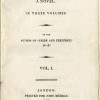
Anne D. Wallace, “On the Deceased Wife’s Sister Controversy, 1835-1907”
For more than 70 years the English engaged in heated public debate about whether a man should be able to marry his deceased wife’s sister. While twentieth-century scholars either ignored this controversy or attributed it to Victorian obsessions with psychological and/or cultural repressions of incest, the documents of the debate suggest that anxiety about the anomalous legal and economic autonomy of unmarried adult sisters drove the controversy. Recent interest in the Marriage with a Deceased Wife’s Sister (MDWS) debates seems fueled by increasing scholarly perceptions of “family” and its various relational terms, including “sister,” as historically and culturally embedded constructs that vary both within and across historical/cultural sites. Re-examined through this lens, the MDWS debates can be understood as negotiating competing ideals of “family” and “household” in which the adult unmarried sister either provided valuable material and/or affective support of the marriage or represented a disturbing intrusion of labor into the domestic space. For literary scholars, the MDWS debates signal the necessity of reading representations of family and, specifically, sibling relations without assuming the stability and/or uniformity of ideas and practices of “family” during the period.

Ayşe Çelikkol, “On the Repeal of the Corn Laws, 1846”
Parliament repealed the Corn Laws, the legislation that controlled the importation of grain, in 1846. Commercial and industrial interests had been advocating the repeal for decades, claiming that the Corn Laws benefited the landed aristocracy at the expense of the middle and working classes. Free traders called for an economic system under which the state would no longer protect landowners. Heated public debates on the Corn Laws, which addressed wages, taxes, and rents, often appealed to religious and moral values, exploring whether free trade was compatible with patriotism and traditional family structures. For the Victorians, national self-reliance and the cosmopolitan spirit of cooperation were both hanging in the balance as Parliament debated the preference for domestic grain.
